Policy Recommendations for Sustainable Grassroots Sports Events Without Waste in the Balkan Region

What
WHY
Use this symbol to go back to the table of


What
WHY
Use this symbol to go back to the table of
Grassroots sport events #WithoutWaste include local and small-scale sport events. This is to distinguish from larger, mass events such as the Olympics or the FIFA World Cup.
Grassroots sport events #WithoutWaste instead focus on small organisations, NGOs, and schools that create local community-related sport events.
In contrast to professionally organised large-scale events, grassroots sport events #WithoutWaste are often established in a bottom-up manner by local volunteers who know the local context but often do not have any training in sustainable event planning or circular resource use.
The main aim is to reduce and reuse waste at events. More specifically, the #WithoutWaste concept is:
+ Providing opportunities for people to participate, infrastructure during sports events (such as clearly visible recycling bins), displays of information related to recycling during events
+ Training staff and volunteers to react and prevent littering and organisations to implement placemaking methods to increase ownership, and understand and adapt to local challenges
+ Communicating the responsibility to recycle for participants, and the efforts made by organisations
+ Collaborating with media to reach out to communities and communicate efforts and with other organisations to efficiently share resources
+ Creating funding opportunities and more experiences of using waste-free strategies (such as reusable plates, cutlery, cups, etc.)
The #WithoutWaste concept can only be successful if the whole community is engaged in developing grassroots sport events for social and environmental change. We can only make a difference together.
This document is intended to inspire local authorities, municipalities, local communities and grassroots sport organisations and facilitate the efforts to create sustainable events. The first step is to consider why it’s important for people to think sustainably. Where in our path can we create value for our event by thinking sustainably?
The recommendations aim to help communities get started. We know that it’s unrealistic to go all the way from day one, but every step counts and hopefully the recommendations provided will make it easier to prioritise.
We must do this work together for our common future.
According to the Zero Waste Cities Report, throughout 2022, there has been continued growth in the adoption of zero waste strategies by European municipalities, including both the number of commitments being made and the impact of these strategies1.
As the problem of climate change becomes obvious and concrete, there is increasing pressure to adopt concrete solutions.
As it’s indicated in the Local Sport Event Policies and Sustainability: A Puzzle Approach article, it requires local authorities, municipalities and future sport event hosts to draw on an alternative policy-event-relationship, namely, “policies on events, 2 ” i.e., policies aiming at regulating events as a supplement or replacement of the currently prevalent “policies and events”—models aimed at using events as a leverage.
Although the role of local authorities and the budget they allocate to the sports and physical activity vary from country to country, they still have a big role to play when it comes to the provision of community sport and physical activity. (The exceptions are some Balkan countries where the activities are centralised and supported directly by the central government such as in Hungary. According to the Eurostat Report in 2018,
1 https://zerowastecities.eu/wp-content/uploads/2023/02/State-of-Zero-Waste-Municipalities-Report-2022-EN.pdf
2 https://www.frontiersin.org/articles/10.3389/fspor.2021.667762/full#B59
the highest share of expenditure on recreation and sport is in Hungary with 2.1% across the EU Member States. It varies from 0.4% of the total expenditure in Bulgaria, Ireland and Malta, to 2.1% in Hungary). 3
The system of decentralisation in the Western Balkans follows the principle of "symmetric distribution" of responsibilities and competences, which means that all municipalities, regardless of their size, have their own statutes, competences and decision-making power4. Sport and culture activities are within the competences of local governments in many western Balkan countries such as North Macedonia, Serbia, Montenegro, Kosovo, Albania etc 5 . From local parks to leisure and sport centres, they work together with local sports clubs, schools, and organisations to provide opportunities for local communities to be active and to participate in grassroots sport and recreation of all kinds.
If you work in a local government, municipality or sustainability-related department in the region you live, please have a look at the list of recommendations and inspiration on the next page.
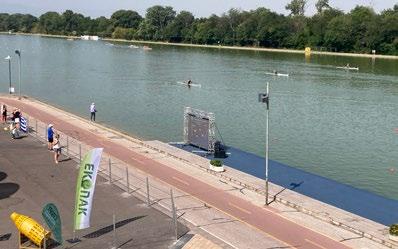
3 https://ec.europa.eu/eurostat/web/products-eurostat-news/-/edn-20200923-1
4 https://issuu.com/kdz_austria/docs/8d3249ad-en (Page 29)
5 https://issuu.com/kdz_austria/docs/8d3249ad-en (Page 41)
■ Prioritise creating an active environment: The places we inhabit can have a considerable effect on our health, behaviour and quality of life. Places that provide opportunities for people to lead physically active lives can positively impact people’s physical and mental wellbeing. Therefore, creating an active environment with the involvement of locals and citizens should be one of the primary goals in the strategy of local authorities.
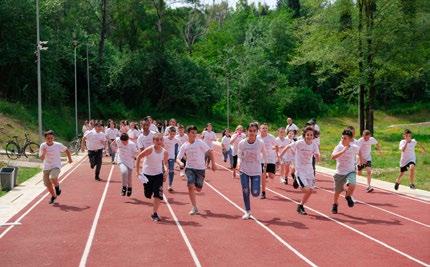
■ A good place to start is by appointing a sustainability officer in the local government and/or municipality. This way, the local community anchors the responsibility for environmental measures with one or more individuals who oversee the community and implementation of green initiatives.
ByKuben is a collaborative project for Oslo municipality, in accordance with the UN's Sustainable Development Goals. It contributes to Oslo municipality by realising its climate and environmental ambitions and aims to make the city greener through both dialogue and staff participating in hands-on guidance and action.
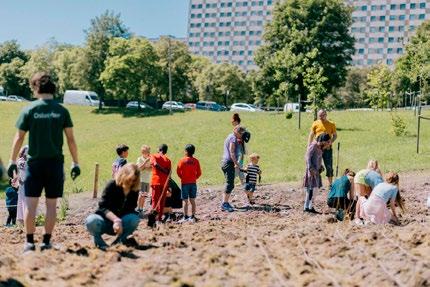
■ Incorporate SDGs into municipalities’ master plans.
The SDGs should be a foundation for every future strategy and decision of the local authorities and municipalities. That's why it's important to include the SDGs in local governments' master plans. Master plans should also be detailed and explain how their aims will affect the specific policy fields of grassroots sport events. Even though master plans of a local government and or a municipality might include “environmental sustainability”, and “green events” broadly, the event policies shouldn’t remain vague in their demands, and they should propose concrete solutions and actions.
Shimokawa Town located in Hokkaido, Japan has been trying to fully incorporate SDGs into their town planning. As the first step, the town developed the Shimokawa Vision 2030 (Shimokawa SDGs) in March 2018 with participation of local stakeholders with diverse backgrounds. Local stakeholders including a representative of a local NGO, a farmer, a teacher, a house-wife, chief of youth group of the local chamber of commerce are participating in the process to incorporate SDGs into the town planning. 6
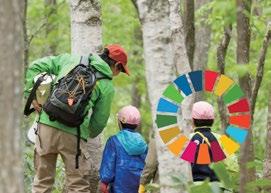
6 https://sdgs.un.org/partnerships/incorporation-sdgs-town-planning-development-2030-vision-shimokawa-town-participatory
The SDGs plan in Albania from the Municipality of Tirana contains 17 objectives that aim for sustainable development across various dimensions. The National Sustainable Development Strategy, as an inter-sectoral strategy, refers to all objectives but provides detailed indicators selected strategically, directly linked to the desired impact in accordance with the Sustainable Development Goals.

■ Municipalities and local authorities should encourage green sport and cultural events by recognising and rewarding them. This would be encouraging for other organisations to develop similar initiatives.
Green Event Salzburg7: The federal state of Salzburg provides events that pay particular attention to ecological, social and economic sustainability with the opportunity to become a “Green Event Salzburg.” All events in the areas of culture, sport, village, city and club festivals are able to apply, and the benefits of being recognised as part of the initiative range from discounts from selected partner companies, free advertising on the region’s website and direct guidance on how to best organise the event in a zero waste manner. Another example is again from Austria: Municipalities organising events in the region of Tirol can apply for certifications that validate their environmental and zero waste credentials as part of the ‘Green Events Tirol’8 initiative.
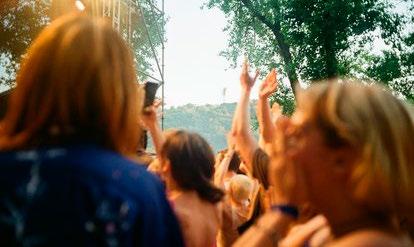
7 https://www.salzburg.gv.at/themen/umwelt/nachhaltigkeit/green-event 8 https://www.greenevents-tirol.at/de/
■ Municipalities can contribute to without-waste sport events by designing, rebuilding, or retrofitting municipal buildings, such as community centres, and sport facilities by involving citizens in decision making process. Placemaking and new urbanism activities focus on human-scaled urban design where people can live healthy and happy lives.
Placemaking is a process of building communities around a place and working with communities to build urban spaces into home-like places. The term was coined by Project for Public Spaces (PPS) in New York City during the 1980s. Please find more here. New urbanism is a modern urban design style based on old European urbanism that focuses on human-scale neighbourhoods, placemaking, and community building9. Read the placemaking examples from Bulgaria, Romania, Spain and Malta here in detail in the Placemaking and Active Recreation Kit (PARK) Online Learning course in order to see the cooperation between local authorities, citizens and grassroots sport organisations in placemaking activities.

9 https://pressbooks.pub/sustainabilitymethods/chapter/the-role-of-municipalities-in-advancing-sustainability/
The Municipality of Tirana, Albanian School Sport Federation and Sabahudin Gabrani School are contributing to the implementation of the project 'School as a community center’. The overall objective of this project is to use gyms and other spaces into active spaces to deliver physical activities for elementary and high schools after official hours and on holidays to educate and enhance mass participation sport in Tirana.
https://fshssh.al/en/events/
shkolla-si-qender-komunitare-sabahudin-gabrani/

Last, but not least, municipalities and local authorities should be aware of their important role on reducing and managing waste at the sport events by10:
+ Including providing equipment and/or recycling and waste services in their event policies, such as water stations, bike racks, and recycling and waste equipment for events.
+ Adopting public procurement policies that prioritise REUSE services and products within municipally-run and sponsored events and facilities.
+ Promoting local, environmentally-friendly alternatives to single-use products, implementing economic incentives that support and prioritise reuse, and building cooperations with local and green providers before, during and after the events.
+ Having a locally-tailored communications strategy by including environmental sustainability at local events and explaining and raising awareness on how green events can contribute to the cities and local communities. 10 https://wechoosereuse.org/our-demand/

Frequently, the organisers of sport events are under time pressure. There are suddenly lots of things to do all at once: papers to organise, hotel lists to draw up, suppliers to negotiate with, and many other tasks, so environmental and social criteria are sometimes neglected during planning and organisation. 11
As indicated in the guide for grassroots sport events #WithoutWaste, using 6 Rs (Refuse, Reuse, Reduce, Replace, Recycle and Remind) is essential in all stages of #WithoutWaste event planning. Among these 6Rs, especially two of them; REMIND and REUSE can play an effective role in terms of choosing the providers and stakeholders with which grassroots sports organisations will cooperate during event planning.
11 https://www.umweltbundesamt.de/sites/default/files/medien/376/publikationen/guidelines_for_the_sustainable_organisation_of_events_bf.pdf
■ Include sustainability in event management right from the start, so as to create the best conditions possible for achieving even greener events. Check if you can Refuse producing and/or ordering materials for your event. Are they really needed? Or do you keep doing it because it's been traditionally done that way for a long time? For example, distributing plastic bottles, single-use promotional materials at events. Create a strategy for environmental sustainability that you can apply to the events you will organise.

■ Convince local authorities and municipalities: Grassroots sport organisations can discuss their event ideas with local authorities and the municipalities they can reach, and to convince the local authorities about the idea of organising a sport event without waste.
When an outdoor festival is organised, places are chosen that are maintained by the local government of that particular city and where there are bins for separate waste collection or the option of a water tank that would serve the needs of festival participants.

■ Collaboration with the right stakeholders: Grassroots sport organisations should prioritise venues that are able to clearly demonstrate their positive environmental impact and supporting waste sorting/recycling, and REFUSE to collaborate with providers and stakeholders that are not aligned with sport without waste principles.
International Sport and Culture Association (ISCA) chose Maison de la Poste in the Tour & Taxi Complex in Brussels as a venue for their MOVE Congress in 2021. One of the main reasons was Tour & Taxis’ commitment to sustainability. “We’ve adapted our ways of working at all levels to prioritise sustainable development,” Tour & Taxis explains on its website. “We consider the usefulness of objects, the mode of transport, the choice of materials, reusability, the commitment to sustainability of event organisers, and more. We are exploring new ways to recycle materials used throughout our multi-functional site, and always promote the use of items that can be reused, repaired and recycled.” 12 Read more here.
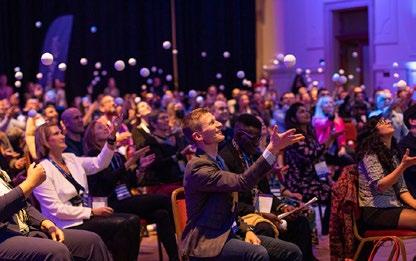
12 https://tour-taxis.com/meet-and-organise/our-commitment/
■ Monitoring & Evaluation: It’s important for grassroots sport organisations to monitor and evaluate their sport events #WithoutWaste. Monitoring and Evaluation during and after the events can help organisations to measure and demonstrate their impact even in low scale action, and encourage them to increase their impact on their local communities and environment.
■ Measure and evaluate your impact: A few things can be done to demonstrate that even low-scale actions can work. One easy way to collect environmental data at events is to weigh the amount of waste that is diverted from landfills.
At events at Linderud Community garden in Oslo, the organisers had youth standing at the waste bins with information to teach people about the different types of waste and how to properly sort them. This was a great educational opportunity because many people want to sort waste but are confused about where the different waste goes! It's also a chance to spark conversations about waste, and what is possible to recycle or compost locally and what just ends up in the landfill anyway. After they had collected all of the waste at the event, they weighed all the different categories so that they could see how much they had saved from the landfill, and what percentage they had of each type of waste so that they could try to improve on that percentage for the next event.

Green Event Certification Programme by an NGO (KÖVET Association) in Hungary. Organisations that are willing to obtain this certificate should meet the criteria of 11 topics related to environmental awareness and social responsibility. The organisations and the specific event are evaluated. After completing the evaluation and conducting an on-site audit of the event, the event is graded on a 5-point scale. If they meet the criteria, the applicant will receive the title of Qualified Green Event and a certificate.13

■ Concrete suggestions and collaboration: Grassroots sport organisations can provide local authorities with a list of green initiatives that can be cooperated with. By approaching local authorities with concrete suggestions, you can convince them to sponsor and/or support your event in-kind (providing waste management support, recycling bins etc.)
13 https://kovet.hu/zold-rendezveny-minosites/
ROMANIA:
1. Green Space Oltenita Association organises kayaking, canoeing and ecological education activities for all age groups.
https://asociatiagreenspace.ro/
https://www.facebook.com/greenspace.oltenita
2. The Act for Tomorrow Association uses resources drawn mainly from the business environment through micro grants for the development of educational and environmental programs for students.
https://actfortomorrow.ro/contact/
https://www.facebook.com/ActforTomorrow
1. SuCO offers another water bottle experience in order to stop single-use plastic bottles that cover our world and have a lifespan of only a few minutes
https://www.mataramasu.co/
2. Bugday Association supports an ecological movement through their markets and networks:
https://www.bugday.org/blog/the-bugday-movement/
3. Sustainable Green Campus in Muğla, Türkiye: This university campus organises sustainable green activities such as cycling, symposiums on climate change etc.
https://yesilkampus.mu.edu.tr/
SERBIA:
1. Association Sport for All Belgrade – organises Eko camp with sports activities every summer. Excursions to the village of Rastište, rafting tour, visit to HPP Bajina Bašta, tour of Tara National Park exhibition, archery training, volleyball, darts, horseshoe throwing, rowing, walking on the health trail, ecological workshops and collection of waste from the coastal part of the lake that threatens flora and fauna. You can find more information about the event:
https://www.sportforall.org.rs/index.php/sr/eko-rekreativnikamp-tara-2016
2. Recycling marathon event: https://arkfruskagora.org.rs/
BULGARIA:
BG Be Active invited the municipalities in Bulgaria to join the environmental cause through competition on the national level. By providing the municipalities with the tips of what particular steps they can take to make the events green and supporting them with resources, the municipalities were encouraged to collect waste separately and organise awareness-raising campaigns among citizens.
https://bgbeactive.org/
nadprevara-eko-otgovorna-obshtina-2023/
HUNGARY:
National Society of Conservationists –Friends of the Earth Hungary: They have the ÖKOHALÓ program which is an environmental education of citizens, especially young people. https://mtvsz.hu/ okohalo-fenntarthatosagra-nevelesi-intezmenyi-halozat
01. Environmental sustainability
https://www.sportengland.org/guidance-and-support/facilities-and-planning/sustainability?section=environmental_sustainability_and_active_design
02. Active design
https://www.sportengland.org/guidance-and-support/ facilities-and-planning/design-and-cost-guidance/active-design
03. The ten principles of Active Design
https://sportengland-production-files.s3.eu-west-2.amazonaws. com/s3fs-public/2023-05/Document%202%20-%20The%20 10%20Principles%20of%20Active%20Design%20-%20Summary.
pdf?VersionId=L46MCn5npJtT3qBnoxKm7d5MOYd7h1ye
04. Placemaking for Active Recreation
www.placemakingforactiverecreation.org
05. Event Guide for Green & Sustainable Events
https://www.dif.dk/raadgivning-og-stoette/idraetsudvikling/ baeredygtighed-i-foreninger/baeredygtige-events
06. Inspiration Guide: Integrating the SDGs into your Multi-Annual Policy Plan:
https://www.local2030.org/library/707/SDGs-in-policy-plan.pdf
07. Local Sport Event Policies and Sustainability: A Puzzle Approach
https://www.frontiersin.org/articles/10.3389/fspor.2021.667762/full
08. What Austria’s ‘Green Events’ initiative shows us about prioritising waste prevention in public events
https://zerowastecities.eu/what-austrias-green-events-initiativeshows-us-about-prioritising-waste-prevention-in-public-events/
09. Playing for our Planet: How Sports Win from Being Sustainable
https://greensportsalliance.org/wp-content/uploads/2019/02/ Report-PlayingforOurPlanetFINAL-2018-05-02.pdf
10. Sustainability Methods & Perspectives
https://pressbooks.pub/sustainabilitymethods/chapter/ the-role-of-municipalities-in-advancing-sustainability/
11. Greening Events: Hong Kong Waste Reduction
https://www.wastereduction.gov.hk/en-hk/ waste-reduction-programme/greening-your-events
12. The State of Zero Waste Municipalities Report 2022
https://zerowastecities.eu/wp-content/uploads/2023/02/State-of-Zero-Waste-Municipalities-Report-2022-EN.pdf
13. We choose reuse website
https://wechoosereuse.org/
14. Guidelines for Sustainable Organisations of Events
https://www.umweltbundesamt.de/sites/ default/files/medien/376/publikationen/ guidelines_for_the_sustainable_organisation_of_events_bf.pdf
15. Municipal Waste Management- good practices
https://www.csir.co.za/sites/default/files/Documents/Waste_Management_Toolkit_0.pdf
16. Green Cities Europe
https://thegreencities.eu/
17. Green Sport Hub
https://greensportshub.eu/wp-content/uploads/2023/07/ IO5-Recommendations-FINAL_EN.pdf
18. World Athletics
https://worldathletics.org/athletics-better-world/news/budapest-23-study-environmental-health-economic-benefits-active-mobility
19. ITTF Group Sustainability (Planet) Action Plan 2025 and GEDI Action plans
https://www.ittf.com/wp-content/uploads/2023/08/ITTF-GROUP-Sustainability-PAP-2025-1.pdf
20. The first action plan of the National Environmental Protection Program of Serbia:
https://www.ekologija.gov.rs/sites/default/files/2014/11/Nacrt-akcionog-plana-Nacionalnog-programa-zzs.pdf
21. Grassroots sport and planetary health – healthy people on a sick planet? by Karim Abu-Omar
https://youtu.be/60gfwJxJLr0?feature=shared
Lead Partner:
Financial Support:
Implementing Organisations:




Expert Partners:

CONTACTS:
BG Be Active Association Bulgaria
www.bgbeactive.org
beactive@bgbeactive.org
DISCLAIMER:
Sport #WithoutWaste (SWW) is funded by the European Union.
Views and opinions expressed are however those of the author(s) only and do not necessarily reflect those of the European Union or EACEA. Neither the European Union nor the granting authority can be held responsible for them.